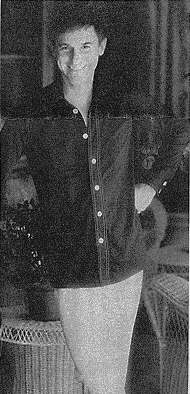On first thought one wouldn’t realize that one of the longest active careers in film belongs to Roddy McDowall. To those of us who still remember Roddy as the sensitive ‘Huw’ of "How Green Was My Valley" or the awkward teenager of "Holiday in Mexico," it’s incredible to acknowledge his 50 years as an actor.
Those five decades include work in his native England before coming to 20th Century Fox in 1940 for his U.S. debut in "Man Hunt," Fritz Lang’s superior thriller. This led to the prize role of ‘Huw’ in John Ford’s Academy Award Best Picture of 1941, "How Green Was My Valley," a performance which I consider one of the all-time greats.
Roddy was perfect as the sensitive Welsh lad who observed the turmoil of the mining-family life whirl about him with an understanding far beyond his years. Roddy entered a very active phase at 20th, appearing regularly in such varied fare as "Son of Fury," "On the Sunny Side," "The Pied Piper," "Molly and Me," "The Keys of the Kingdom," and in the most surprising casting became completely Americanized to play the Wyoming lad in the film version of Mary O’Hara’s "My Friend Flicka" and its follow-up "Thunderhead, Son of Flicka."
Roddy not only displayed an affinity with horses on the screen but also his heart went out to the canine ‘Lassie’ when MGM borrowed him for the 1943 film based on Eric Knight’s classic story "Lassie Come Home." This film brought him together with a young lass just beginning her Hollywood career,
Elizabeth Taylor, and their friendship has lasted strong and true ever since. Roddy and Elizabeth appeared together in MGM’s 20th Anniversary Picture "The White Cliffs of Dover" in 1944—and when both were adult stars there was the highly publicized "Cleopatra" of 1963—and a 1983 television teaming in an episode of "Hotel."
AWKWARD AGE
Entering his teens Roddy survived the so-called ‘awkward age’ of most of his contemporaries. The pictures he made at Monogram: "Tuna Clipper," "Killer Shark," "Big Timber," and Robert Lewis Stevenson’s "Kidnapped," may not have had the production trappings of an MGM or 20th Century-Fox effort, but Roddy kept his hand in the acting arena—and even participated in the production area of these two releases. Important at this stage of his career was the chance to work with Orson Welles in low-budget, quickie version of "Macbeth" which went out through Republic in 1948. In recent years this Welles production of Shakespeare’s "Scottish play" has had some excised footage restored and its reputation has been re-evaluated most favorably.
Roddy has kept busy on the stage as well. He has appeared in several stock productions and has achieved notable Broadway success in such hits as "Compulsion," "No Time For Sergeants," and "Camelot."
As a photographer, Roddy published a volume of celebrity portraits entitled Double Exposure. Many of these star portraits can be found on postcards in shops specializing in movie-oriented material.
Back at his old home studio 20th Century-Fox in 1968, Roddy donned intricate make-up to transform himself into an ape for the smash hit "Planet of the Apes." This led to some steady employment—and heavy make-up—for the same assignment in the four sequels that followed.
In a recent Baltimore-Sun interview McDowall told film critic Stephen Hunter: "I miss the expertise of the old studio movie factories…every department was so sophisticated and organized. Now you have to start from scratch with each film. There isn’t a fully stocked prop department anywhere in Hollywood." Although not bitter about his child actor days, McDowall declared: "The studios owned your body and soul—and if you fought their preconceived notions of you, you went into the stocks."
FADED DAYS
Roddy feels that his acting craft wasn’t really developed until his Hollywood days faded and he was forced to attempt the stage. As for disillusioned child actors, Roddy has this to say: "Equally as many have done well (in adult life) as have done poorly….a lot of the kids just didn’t want to to go on acting. They went into other careers and have done well."
Roddy was last seen on screen in "Fright Night," for which he received some of his finest reviews ever, in a career that has spanned over a hundred films, three tv series, several plays, and hundreds of television guest spots. Certainly the varied output of his career over all these years makes Roddy McDowall Hollywood’s most consistently active Survivor.

